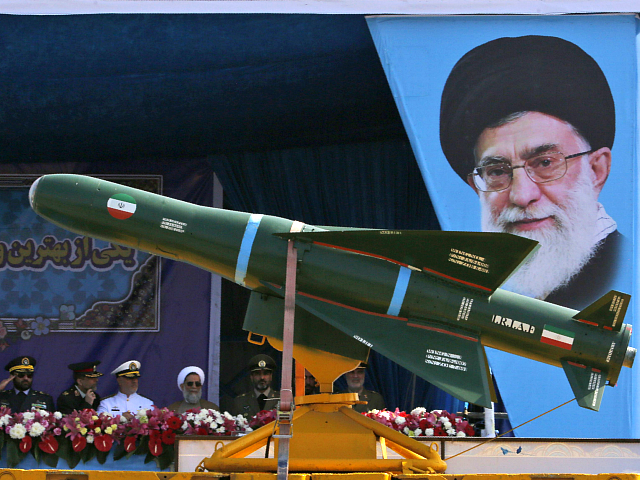TEL AVIV – Iran has mounted precision-guided warheads on its most advanced, longest-range missiles, the regime-affiliated Fars news agency reported Sunday.
With a range of some 1,250 miles, the Khoramshahr-2 missile can reach Israel as well as U.S. bases in the Gulf.
“The new generation of missiles with guided warheads has been named Khoramshahr-2 and they can be controlled until hitting the target and are able to carry warheads weighing nearly 2 tons,” the report said.
The new warheads had in the past been mounted on the shorter range Emad, Qadr and Qiam missiles.
Iran claims that its ballistic missiles are only designed to carry conventional warheads.
The report comes a day after Iran boasted that it had successfully fired a new cruise missile with a range of 800 miles in defiance of U.S. demands that the Islamic Republic cease expansion of its ballistic missile program.
The missile, called Hoveizeh, is said to be a high-precision weapon capable of flying at low altitudes and carrying a heavy payload.
Prime Minister Benjamin Netanyahu responded to the news, saying, “I have a clear message to the tyrants of Tehran: We know what you are doing and where you are doing it. We will continue to take action against Iran with all the tools at our disposal in order to ensure the security and future of Israel.”
Secretary of State Mike Pompeo in December charged Iran with test-firing a medium-range ballistic missile capable of “carrying multiple warheads.”
The missile could reach parts of Europe and anywhere in the Middle East, Pompeo said, and the test was in violation of United Nations Security Council Resolution 2231, part of the 2015 nuclear deal that calls for Iran to stop pursuing “any activity related to ballistic missiles designed to be capable of delivering nuclear weapons, including launches using such ballistic missile technology.”
“As we have been warning for some time, Iran’s missile testing and missile proliferation is growing. We are accumulating risk of escalation in the region if we fail to restore deterrence,” Pompeo said.
“We condemn these activities,” Pompeo added, “and call upon Iran to cease immediately all activities relating to ballistic missiles designed to be capable of delivering nuclear weapons.”
Pompeo’s statement came days after Amirali Hajizadeh, the head of the air division for Iran’s Islamic Revolutionary Guards Corps, said that Iran’s missile arsenal could reach U.S. bases in Qatar, the UAE and Afghanistan in addition to U.S. aircraft carriers stationed in the Persian Gulf.
“They are within our reach and we can hit them if the [Americans] make a move,” Hajizadeh was quoted by Reuters as saying.
Iranian Foreign Ministry spokesman Bahram Qasemi stopped short of confirming the missile test but responded to Pompeo’s statement by claiming that his country’s missile program did not violate any UN resolutions.
“Iran’s missile program is defensive in nature. … There is no Security Council resolution prohibiting the missile program and missile tests by Iran,” state news agency IRNA quoted Qasemi as saying in December.
The U.S. and other Western officials have dismissed Tehran’s claims that the ballistic missile program is defensive in nature. Last year, Israeli Prime Minister Benjamin Netanyahu presented a massive trove of documents smuggled out of Iran by the Mossad that he said was conclusive evidence of Tehran’s nuclear aspirations.

COMMENTS
Please let us know if you're having issues with commenting.